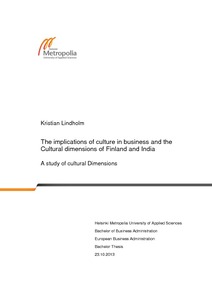Identifying the organizational culture in a multicultural hybrid workplace
Ahokas, Heidi (2024)
Ahokas, Heidi
2024
All rights reserved. This publication is copyrighted. You may download, display and print it for Your own personal use. Commercial use is prohibited.
Julkaisun pysyvä osoite on
https://urn.fi/URN:NBN:fi:amk-2024052013549
https://urn.fi/URN:NBN:fi:amk-2024052013549
Tiivistelmä
The purpose of this thesis was to investigate the current state of the organizational culture in the case company. The organizational culture was examined from the perspective of values and underlying assumptions, together with different forms of collaboration and communication. The purpose of this thesis was to provide the case company with up-to-date picture of the current state of the organizational culture based on the data obtained from the research. The commissioner for this thesis was a multicultural software company operating in Finland, Germany, and US with staff working in hybrid model. The focus for this thesis was to identify the organizational culture at the Finnish headquarters.
The theoretical framework of the thesis is built around organizational values and three organizational culture theories: Edgar H. Schein’s Organizational Culture theory, Geert Hofstede’s Cultural Dimensions theory, and Robert Quinn and Kim S. Cameron’s Competing Values Framework. At first, the theories on organizational values and organizational culture are explored. The focus is placed on organizational values and the impact of those on the feeling of belonging or the personnel and the competitive edge of the organization as whole. The contents of a culture handbook are also discussed in the thesis. For that, six different culture handbooks were benchmarked to identify what information to include in the case company’s first culture handbook.
The research was conducted using design thinking method, involving the entire staff of the company in two workshops that used facilitation methods. The staff members participated in two participatory workshops through which the data was collected in May 2023. Based on the research, it was found that the culture in the organization is generally heavily linked to the organizational values but also on the joined lived experiences. A strongly influential factor here is that the individuals in the organization genuinely enjoy having an impact on the work and the culture in the case company. Individuals felt that the organization is living up to the espoused values. Based on these results, conclusions were drawn to help the case company describe the organizational culture and attract like-minded people.
The theoretical framework of the thesis is built around organizational values and three organizational culture theories: Edgar H. Schein’s Organizational Culture theory, Geert Hofstede’s Cultural Dimensions theory, and Robert Quinn and Kim S. Cameron’s Competing Values Framework. At first, the theories on organizational values and organizational culture are explored. The focus is placed on organizational values and the impact of those on the feeling of belonging or the personnel and the competitive edge of the organization as whole. The contents of a culture handbook are also discussed in the thesis. For that, six different culture handbooks were benchmarked to identify what information to include in the case company’s first culture handbook.
The research was conducted using design thinking method, involving the entire staff of the company in two workshops that used facilitation methods. The staff members participated in two participatory workshops through which the data was collected in May 2023. Based on the research, it was found that the culture in the organization is generally heavily linked to the organizational values but also on the joined lived experiences. A strongly influential factor here is that the individuals in the organization genuinely enjoy having an impact on the work and the culture in the case company. Individuals felt that the organization is living up to the espoused values. Based on these results, conclusions were drawn to help the case company describe the organizational culture and attract like-minded people.
Kokoelmat
Samankaltainen aineisto
Näytetään aineisto, joilla on samankaltaisia nimekkeitä, tekijöitä tai asiasanoja.
-
The implications of culture in business and the Cultural dimensions of Finland and India : A study of cultural Dimensions
Lindholm, Kristian (Metropolia Ammattikorkeakoulu, 2013)The purpose of the thesis is to examine the implications of culture in business. The thesis makes use of the most popular theoretical frameworks in the field, namely the cultural dimensions where data has been chiefly ... -
Role of Culture in Everyday Work Interaction and Adaptation to Russian Environment : Differences in values, culture and business culture Finnish expatriates should be aware of
Vehviläinen, Tarmo (Jyväskylän ammattikorkeakoulu, 2015)This bachelor’s thesis is a study of national cultures, business cultures and business practices differences between Finland and Russia. It was targeted to aid Finnish expatriates already in - or about to move to Russia. ... -
The Role of Cultural Intelligence in Facilitating Tacit Knowledge Sharing in ICT Organisations in Vietnam : exploring the role of motivational cultural intelligence and behavioural cultural intelligence
Nguyen Thi, Van (2024)Vietnam's rapidly growing ICT sector plays a pivotal role in the country's economic development and global integration, attracting a diverse and multicultural workforce. This diversity underscores the importance of cultural ...


